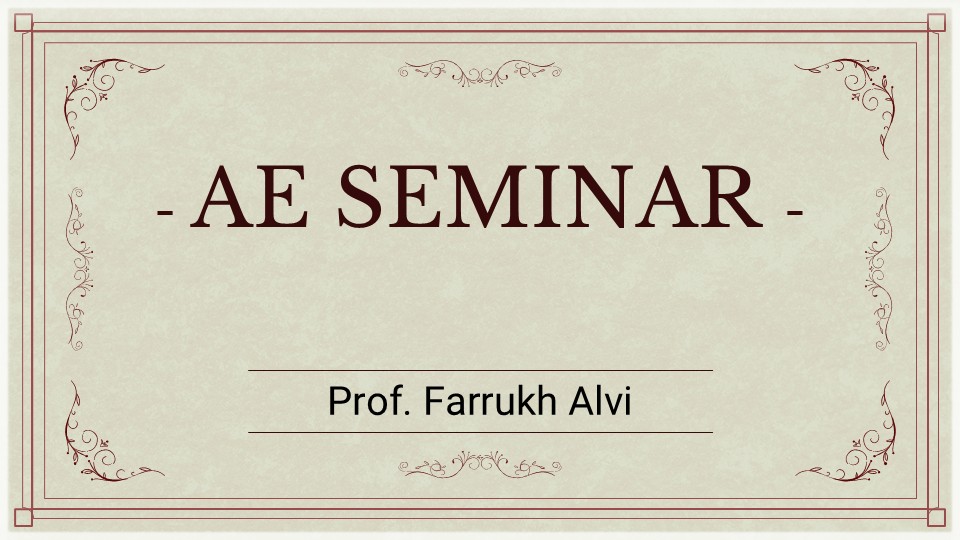
- This event has passed.
Experimental Studies and Control of Subsonic & Supersonic Flows Strategic Opportunities for Collaboration with Florida State University
October 22, 2025 @ 4:00 PM - 5:00 PM

This talk will consist of parts: The first provides an overview of some interesting and challenging problems that have been studied over the past three decades by my research group. These studies span subsonic and supersonic flows and often involve developing or applying advanced diagnostics in difficult environments allowing us to peer into complex, feature-rich flows and offering significant insight into the governing physics. I will highlight a few, representative, complex flows. The first problem involves subsonic flow around a cylinder with a slanted base—a canonical bluff body geometry analogous to an aircraft fuselage that is often dominated by strong unsteady-meandering vortices. The second consists of supersonic single and dual impinging jets – canonical models of flows that occur in VTOL/STOVL aircraft during hover. They often produce highly unsteady aeroacoustics that are resonance driven resulting in extremely high noise levels, fatigue of structures and other issues. The third example is the three-dimensional flow field due to single and dual-fin generated swept shock wave/boundary layer interaction (SBLI). Such interactions are ubiquitous in supersonic-hypersonic air vehicles where they can impact internal and external aerodynamics. If time permits, examples of implementing active flow control (AFC) for some of these problems will also be examined.
The research discussed herein is a very limited subset of the broad array of advanced research being conducted at Florida State University (FSU) by its faculty and students, using many unique and cutting-edge facilities. An introduction to some of FSU’s core research strengths and capabilities is the focus of the second part of the talk. In addition to the STEM-focused fields, FSU’s has many other areas of significant and emerging strength such as Health, Business, Entrepreneurship and Innovation-driven translation. As a result, I hope to catalyze a dialogue between our institutions to identify a framework and paths for mutually beneficial partnerships. Such partnerships may include, but are not limited to, faculty exchanges, joint research proposals and projects, and student exchanges and residencies abroad, with the goal of amplifying global exchange of ideas, accelerating discovery and enhancing national and international impact.
Speaker: Farrukh Alvi
Biography :
Farrukh Alvi is the Don Fuqua Eminent Scholar and Professor of Mechanical & Aerospace Engineering. He also serves as the Senior Associate Provost for Strategic Initiatives and Innovation at Florida State University, where he helps drive major institutional projects and partnerships. Over the past two years in this role, Farrukh has led strategic initiatives from the Provost’s Office that have strengthened FSU’s global engagement, advanced institutional innovation, and expanded collaborative research opportunities across disciplines. He recently completed an IPA assignment as the Director for Institutional Research Capacity and Strategic Growth at the Basic Research Office under the Office of Undersecretary of Defense (Research & Engineering). Previously, Farrukh served as the Senior Associate Dean for Research & Graduate Studies at the FAMU- FSU College of Engineering for nearly 6 years including as the Interim Dean in 2022. In 2023, he co-led Florida State University’s development and funding of a landmark $160M+ proposal for the Institute for Strategic Partnerships, Innovation, Research, and Education (InSPIRE), ultimately serving as its founding Executive Director. He also leads, as principal investigator, a multi-institutional NSF Engines proposal to create the Florida Advanced Manufacturing Engine (FLAME), which was selected as a semifinalist. His efforts overseeing InSPIRE and FLAME have catalyzed new models for institutional collaboration and innovation. He is the founding director of the Florida Center for Advanced Aero-propulsion (FCAAP), a multi-university, state-wide research, training and education center he helped establish in 2008. Farrukh received his B.S. in Nuclear Engineering from UC Berkeley and his PhD in Mechanical Engineering from Penn State University. His research focuses on fundamental phenomenon, primarily in compressible flows; active flow and noise control, including the development and use of micro-fluidic actuators; and the development and use of advanced diagnostics. He holds numerous patents in his areas of research. His research has been funded by numerous US government entities(NSF, AFOSR, ONR, DARPA, ARO) and industry. He has mentored more than 60 PhD and MS students, post-doctoral researchers and scientists. He is a Fellow of the Royal Aeronautical Society, Fellow of ASME, an Associate Fellow of AIAA and has served as an Associate Editor of the AIAA Journal.